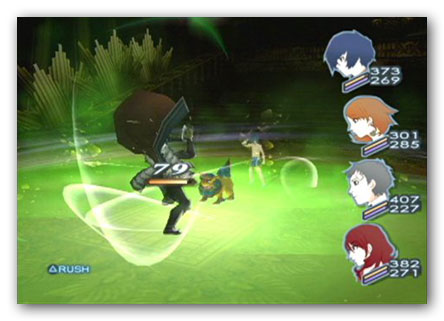One of the things I like about RPGs is that they tend to be long. There’s no five-hour RPG and a 10-hour RPG would be a notable aberration. A 20-hour romp would seem to be the norm these days and a game that takes double that time from start to finish would not be uncommon. The genre usually offers a lot of game for your buck.
In writing terms, that allows plenty of time to develop story and characters, to give both body and nuance. In gameplay terms, there’s enough time to accommodate complex game systems. Skill development can be deep and combat systems can be sophisticated since players have plenty of time to explore and experiment.
RPGs can, of course, wear out their welcome. Final Fantasy XII was a game too long for its own good. I gather the game can be completed in 40 hours and I’m assuming that was accomplished by a gamer experienced with the mechanics and not averse to referring to FAQs and forum posts for help when stumped. I took 100 hours to finish FF12 — that’s excluding the hours of failed attempts — and I was ready for the game to be over at the 50-hour mark.
It was particularly frustrating because Square Enix never made good use of my invested time. The story elements were barely developed and the characters never fully realised. The game was just dragging on. Once the “I beat the game!” buzz wore off, I looked back on the experience with little fondness. I expect I might pop in the DVD-ROM again at some point in the future to complete the optional content I bypassed but there’s absolutely no way I would want to replay the game from beginning to end.
Back to school
I’m currently playing Persona 3 FES, an Atlus RPG that plays out over the course an entire school year. By my estimates, that one year of game time is going to take well over 100 hours of real-world gaming.
There are some interesting time-related mechanics in P3F, most of which are in place to ensure the game lasts an entire in-game school year. The nice thing about these limits is they minimise grinding and repetition. On the other hand, they also make the game experience a little more drawn out than it should be.

(Image source: SCEA.)
The bulk of the action in the game takes place in Tartarus, a dark tower filled with Shadows, the opponents in the game. You ascend the tower level by level, defeating Shadows, acquiring loot and experience. Find a staircase, climb it and you’re on the next level.
One of the exasperating quirks in the game is you may not descend a staircase to return to a lower level. Instead, you have to locate an access point (which returns you to ground level) or a Terminal Point (which teleports you to any previously unlocked Terminal Point). These aren’t available on every Tartarus level so the impetus is mainly to go onwards and upwards.
At least, until the designers force you to stop.
Despite being a tower, Tartarus is a dungeon for all intents and purposes, and it will be hard for those with a typical gamer mindset to resist the impulse to play as much as possible in order to level up as much as possible. However, the developers actively discourage this in three ways.
Lingering too long on a level is discouraged by the introduction of a nigh-unbeatable foe after a set period of time has elapsed. Players are given enough time to explore and clear a level of Shadows but tarrying too long will result in a warning something deadly is headed your way. This is the signal to scramble for the staircase.
The second anti-grind measure is the fatigue mechanic. Characters get tired during extended sessions in Tartarus resulting in reduced effectiveness in battle. Tired characters also require time to recover making them unavailable for Tartarus adventures for a few days.
Finally, there are barriers placed on various levels which prevent further progress. These barriers, the crudest and most arbitrary of the measures to prevent the gamer from advancing too fast, are only unlocked after boss battles and those battles only occur once an in-game month.
Taken in toto, it’s hard to escape the feeling this is a game whose designers don’t want you to play it too much.
